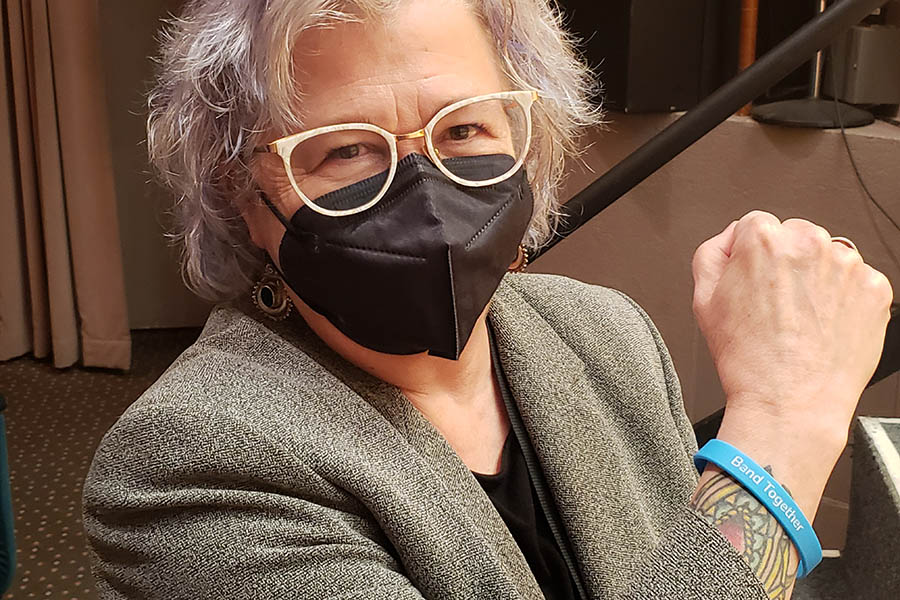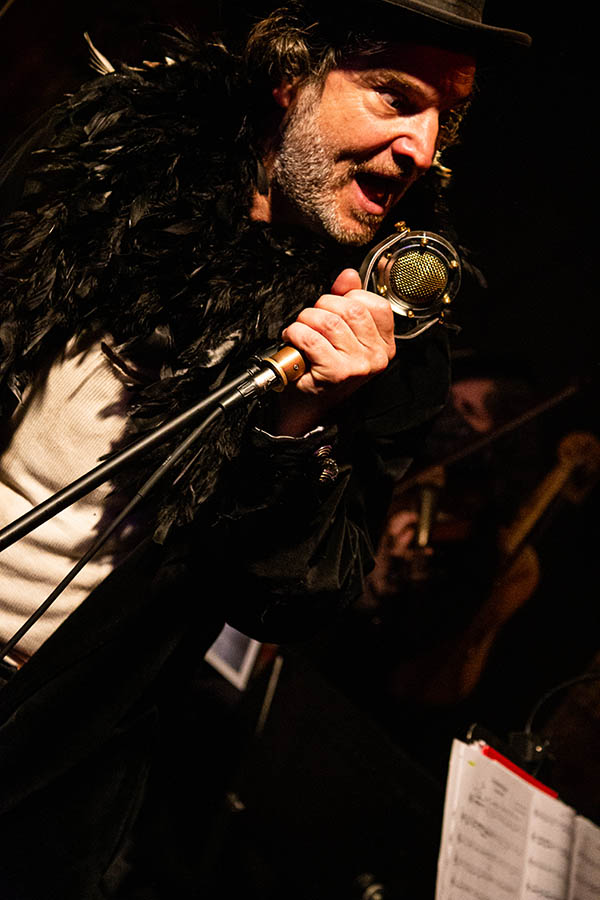As theaters and concert halls across the state resume live performances, the lessons of COVID-19 — and new digital dimensions — are here to stay.
As theaters and concert halls light up once again, new protocols — and new technologies adopted during the pandemic — will mean audiences will return to an arts scene that has both struggled and leapt forward.
Some venues will be requiring proof of vaccination for live performances, and have sought third-party certification assuring their venues are as safe as possible for audiences.
And while many arts organizations hastily pivoted to offering digital performances at the onset of the pandemic, some have decided to continue livestreaming events for the long haul.
“It’s a major moment right now for all of the arts,” says violinist Emily Cole at a Sept. 15 demonstration of Arlene Schnitzer Concert Hall’s new sound system.
The new sound system will both enhance live performance and smooth sound for audio recordings — a sign of the times as arts venues both return to the stage and continue with newly popular digital offerings.
Cole and her fellow performers expressed gratitude for their ability to return to the space for the symphony’s fall season, set to debut Oct. 2. Several got tears in their eyes as they spoke with Oregon Business, and one musician described returning to the stage as “elation.”
Installation of the Meyer Sound System was planned before the venue shuttered last spring due to crowd-size restrictions. Robyn Williams, executive director of Portland’5 Center for the Arts — which manages the Schnitzer as well as Keller Auditorium and the Winningstad, Newmark and Brunish theaters — says the installation of the system was a “silver lining” of the COVID-19 pandemic. Management decided to go ahead with the installation despite an uncertain financial future.
 Portland’5 executive director Robyn Williams. Photo: Sander Gusinow
Portland’5 executive director Robyn Williams. Photo: Sander Gusinow
“There were too many community partnerships involved. To pull out would have been to lose too much money. We made the decision to carry on,” says Williams.
City and federal funding carried the organization for the last two years. The $3.2 million from the CARES Act and an additional $8 million in the form of a Shuttered Venue Operators Grant — made possible by the American Rescue Plan — meant the venue could continue to comfortably lay dormant.
Williams was not coy about the challenging financial situation, nor how difficult the last two years have been. She estimates it will be three years before audiences return to normal levels and revenues stabilize.
For that, Portland’5 is doing everything it can to keep audiences virus-free. All visitors must show proof of vaccination or a negative test, and all buildings have been accredited by the Global Biorisk Advisory Council, an international network that certifies facilities to prevent, respond to and recover from outbreaks and biohazard situations. Staff needed to be retrained, which was an additional cost.
“But things are looking good for P5,” says Williams, who mentioned an upcoming performance by humorist David Sedaris was nearly sold out. “People are hungry to come back.”
While audiences readjust to live performance, performing arts companies have already made the foray into offering digital content.
In Ashland the Oregon Shakespeare Festival welcomed back audiences in July, one year after the launch of O!, a digital platform which aired its first-ever livestream production of Shakespeare’s A Midsummer Night’s Dream. The move was part of a grander strategy to give the festival global reach. For a $15 E-ticket, audiences can stream OSF’s content from the comfort of their bedroom.
For Artists Repertory Theatre in Portland, the pandemic meant a new, digital direction for the company. Artists Rep had created digital content before the pandemic, but COVID-19, along with a rebranding campaign with Grady Britton, gave the company a chance to reimagine what it means to be a performing arts company. Artists Rep produced a collection of 21 short films, digital performances and audio dramas through the Mercury Company, an artist-led collective tasked with creating content accessible under pandemic conditions.
Dámaso Rodríguez, artistic director of Artists Rep, says digital offerings have led to inspired, unexpected success.
“There has been a lot of play development work that has happened just in Zoom rooms,” says Rodríguez, who expects blending digital and live performances to be part of the company’s strategy moving forward. “The works can be unconventional. They can be digital, they can be in person, they can be hybrid. We are trying to capture the creative spirit of the online performances we did.”
On Oct. 22, Artists Repertory Theatre will premiere The Chinese Lady, the company’s first indoor live performance since COVID-19. But from September 18 to 25, the company performed Campfire Stories, an outdoor, site-specific version of a storytelling series created during the pandemic.
Across the country, theater companies have found success with digital audiences, especially newcomers. A JCA Arts Marketing study conducted last year and released in March found 43% of people who watched a live digital performance last year had never attended an in-person performance at the theatre hosting the event.
Artists Rep will continue to create short film content to make available online. Rodríguez also wants high-quality, multicamera recordings of live performances for online audiences. Online audience members will be offered tickets to these shows on a sliding scale — sometimes free — to grow awareness of the company nationwide.
The organization has also begun to offer online theater classes and workshops, and plans to continue to do so.
“We’re not going to let go of what we learned from working across disciplines. It’s very encouraging to keep thinking this way,” says Rodríguez. “Why are we often told theater isn’t for everyone? Because prices go up every year and the audience base doesn’t grow. This is a chance to grow and diversify our audience.”
Performing arts spaces are also taking precautions to ensure the safety of audiences and performers.
The company joined more than 50 performance venues, including the Oregon Symphony and the Oregon Ballet Theatre, to create the Portland Performing Arts Vaccine Coalition. The coalition ensures protocols are in place to prioritize the health and safety of audience members, artists, staff, volunteers and the greater community.
One of the essential requirements, that all audience and performers show proof of vaccination or a negative COVID-19 test, has been met with some pushback. For some Oregonians, requiring vaccinations and masking up are political red flags.
“I’m not going to lie, we’ve gotten some hate mail,” says Williams. “But staying healthy is the priority. And I’m not sure those people would be coming to the performances anyway.”
Portland Center Stage has also felt the pandemic budget crunch. Instead of reviving The Curious Incident of the Dog in the Night-Time — which opened Feb. 29, 2020, and shuttered in mid-March — has decided to produce a one-woman show based on the life of Frida Kahlo, using the Curious Incident set as a backdrop.
Cynthia Fuhrman, managing director of Portland Center Stage at the Armory, says her company learned a great deal about the online space during the pandemic. Online theater classes will become more prevalent. The digital space also offers audiences the unique opportunity to interact with performers in real time without derailing the show, something the company will capitalize on moving forward.
Inspired by this concept, Portland Center Stage will perform a “Choose Your Own Adventure”-style theater piece, where audiences will be able to choose certain elements of the performance as they watch in real time. The company will also expand digital talkbacks and digital happy hours.
Fuhrman was clear, however, that the theater will be focused first and foremost on live performances.
“We’re not sure how much we can support digital work,” says Fuhrman. “The live-theater experience is irreplaceable.”
“Over the last several years, our society has been conditioned to be able to access incalculable amounts of video content for free or for very low cost,” says Oregon Symphony president and CEO Scott Showalter. Though he expects the online offerings to continue, the symphony’s primary source of earned income will always be live performance.
Smaller venues, too, are beginning to offer digital productions on a permanent basis. For the Very Little Theatre in Eugene, the pandemic provided an opportunity to remodel, as well as launch the Virtual Little Theatre, an online platform of video and audio performances with content for children and adults.
The online platform was a success in bringing its members together, many of whom could not attend live shows due to mobility challenges. Additionally, the new virtual offerings have encouraged viewership from members’ families on the East Coast.
The company’s reopening ceremony on July 11 was also a livestream event.
“Before the pandemic, monthly membership was dwindling. People had mobility issues or scheduling problems. Now our member meetings are full,” says Jessica Ruth Baker, development coordinator of the Very Little Theatre. “The lesson we learned is that you have to meet people where they are at,” says Baker. “This has really changed the fabric of who we are.”
 Actor Jean-Luc Boucherot performs in Danse Macabre:The Testament of François Villon. Photo: Sarah Marguier
Actor Jean-Luc Boucherot performs in Danse Macabre:The Testament of François Villon. Photo: Sarah Marguier
For director Štĕpán Šimek, creating theater now — and performing in front of a live audience — is as vital as ever.
On March 12, 2020, his production of Danse Macabre: The Testament of François Villon through the Hand2Mouth theater company in Portland was shut down on opening night. The close was so sudden, the company had to have members on-site turn away audiences at the door.
On Sept. 16, 2021, the show received a resurrection.
“We just sort of came to the decision: ‘For crying out loud, we cannot let all these unvaccinated people decide how we live our lives,’” says Šimek. “We have got to start living again.”
All performers and audience members for Danse Macabre are required to show proof of vaccination. The intimate staging, which seats people shoulder to shoulder, may already test some people’s boundaries. Audience members will have to assess their own level of comfort returning to the theater.
For Šimek, the decision to move forward was not just about his own show. As people grapple with the decision to reenter society, the performing arts have a responsibility to raise the curtains.
“The arts are going to be a gateway for people to start to have a normal life,” he says.
To subscribe to Oregon Business, click here.







